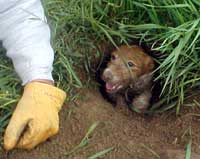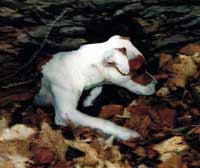Working History of the Jack Russell Terrier
The Jack Russell Terrier takes it name from the Reverend John Russell who bred one of the finest strains of terriers for working fox in Devonshire, England in the mid-to-late 1800's.

 The Jack Russell Terrier takes it name from the Reverend John Russell who bred one of the finest strains of terriers for working fox in Devonshire, England in the mid-to-late 1800's. John Russell maintained his strain of fox terriers bred strictly for working (i.e., hunting), and the terrier we know of today as the Jack Russell is much the same as the pre-1900 fox terrier. The Jack Russell has survived the changes that have occurred in the modern-day Fox Terrier because it has been preserved by working terrier enthusiasts in England for more than 100 years; it has survived on its merits as a worker. It is the foremost goal of the JRTCA that the Jack Russell continues in that tradition.
The Jack Russell Terrier takes it name from the Reverend John Russell who bred one of the finest strains of terriers for working fox in Devonshire, England in the mid-to-late 1800's. John Russell maintained his strain of fox terriers bred strictly for working (i.e., hunting), and the terrier we know of today as the Jack Russell is much the same as the pre-1900 fox terrier. The Jack Russell has survived the changes that have occurred in the modern-day Fox Terrier because it has been preserved by working terrier enthusiasts in England for more than 100 years; it has survived on its merits as a worker. It is the foremost goal of the JRTCA that the Jack Russell continues in that tradition.
 Everything about the Jack Russell has fox hunting in mind - coloring, conformation, character, and intelligence. The body is compact, of totally balanced proportions, the shoulders clean, the legs straight, and most importantly, a small chest (easily spannable by average size hands at the widest part behind the shoulders). The Jack Russell must also be totally flexible, allowing him to maneuver underground. This conformation allows the terrier to follow his quarry down narrow earths. The fox is a good model for the Jack Russell - where the fox can go, so must the terrier. Although originally bred for fox hunting, the Jack Russell is a versatile working terrier to a variety of quarry including red and grey fox, raccoon and woodchuck.
Everything about the Jack Russell has fox hunting in mind - coloring, conformation, character, and intelligence. The body is compact, of totally balanced proportions, the shoulders clean, the legs straight, and most importantly, a small chest (easily spannable by average size hands at the widest part behind the shoulders). The Jack Russell must also be totally flexible, allowing him to maneuver underground. This conformation allows the terrier to follow his quarry down narrow earths. The fox is a good model for the Jack Russell - where the fox can go, so must the terrier. Although originally bred for fox hunting, the Jack Russell is a versatile working terrier to a variety of quarry including red and grey fox, raccoon and woodchuck.
The JR is bred to have the courage to follow a fox to ground and stay with it until the quarry bolts, is dug to, or the dog is called out; they are intended to bay (bark) at their quarry, not to kill. Many a Jack Russell has been known to stay in an active earth for days, even weeks, without food or water because of the strong instinct bred into them to stay with their quarry. It can be very frightening experience to lose your terrier and an impossible situation to the untrained owner inexperienced in earthwork; the results could be tragic.
Health care tips for the Working Jack Russell Terrier

- Feed your terrier plenty of high quality dog food. Don't skimp and try to save money by feeding a cheap, low protein, high fat food.
- Feed your terrier the morning you hunt him and take at least half-ration to give him at noon if he has been working all morning. Sending a terrier into the field without breakfast can be dangerous as his sugar level drops and he potentially approaches hypoglycemia.
- Make sure your terrier is fit before taking him in the field. A fit terrier is definitely NOT a thin terrier. Fitness has to do with muscle tone and staying power, neither of which your terrier can attain if he is thin.
- If you hunt your terrier in the ice and snow, periodically check the pads of his feet and in between his toes for cuts, abrasions, and signs of frost bite.
- Don't expect your terrier to be able to brave the severe winter cold or extreme summer heat if he is a house mouse 24 hours a day.
- Make sure your terrier is current on all of his vaccinations. Spending a few extra dollars on annual rabies and lyme vaccinations may save your terriers life.
- After the hunt, flush your terrier's eyes with plenty of sterile water and check to make sure there are no pieces of grit left in his eyes. It is a good idea to follow the eye wash with an anti-bacterial eye ointment such as Terramycin eye ointment. Check the eyes the next morning for signs of grit you may have missed, and if necessary, flush the eyes again and follow with a sterile eye ointment.
- Make sure your hunting pack is complete. Take along a knife, limb saw, flash light, tea bags (family size--wet them and hold tightly over a laceration; the bleeding will stop in a few minutes), post hole diggers, large and small shovels, a metal bar, towels and blankets to wrap your terrier in, plenty of fresh water, extra batteries for your collars and box, and an extra collar and box if you have one.
- It's a good idea to have a cellular phone and the telephone numbers of several vets in the area. A cell-phone and a local vet may save your terrier's life if he gets into skunk many miles from home!
- Remember, prepare for the worst and expect the best.
Your terrier depends upon you for safety, you depend on your terrier for everything else.
If you are JRTCA member and are interested in working your Jack Russell Terrier, please contact the nearest JRTCA Sanctioned Working Judge (a list can be found in True Grit magazine).